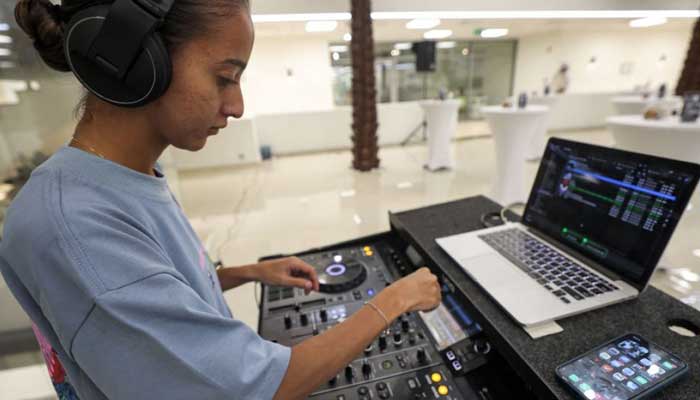
JEDDAH: Saudi DJ Leen Naif seamlessly transitions between pop hits and club tracks for a group of business school graduates enjoying sushi while seated behind her control tower and wearing headphones around her neck.
The low-key setting is a far cry from the high-profile venues that have helped the 26-year-old DJ Leen establish herself on the Saudi music scene, such as the Formula 1 Grand Prix in Jeddah and Expo 2020 in Dubai.
Nevertheless, it captures a significant turning point: Women DJs, previously an unimaginable phenomenon in the traditionally ultraconservative kingdom, are now fairly common in its major cities.
As they perform gig after gig and attempt to make a living from what was once just a hobby, they no longer draw much attention.
According to Naif, “a lot of female DJs have been coming up,” and as a result, audiences have grown “comfortable” with seeing them perform.
“It’s simpler now than it ever was.”
Up until recently, Mohammed Nassar, a Saudi DJ known as Vinyl Mode, said that “we didn’t expect” DJs to be welcomed at public events, let alone that so many of them would be women.
More female artists are now emerging, Nassar claimed.
Before, “expressing oneself in their bedrooms was just a hobby.”
“We now have platforms, and they might even lead to careers. This is truly amazing.”
converting sceptics
When Naif was a teenager, one of her uncles first introduced her to electronic music, and she almost immediately began to wonder if DJing was a career she could pursue.
While her friends fantasised about becoming doctors and teachers, she knew she lacked the patience to devote to the years of education these professions required.
She declared, “I’m not a study person; I like to work.
She was immediately supported by her parents and siblings, unlike other female DJs.
But there were other Saudis that needed some persuading.
A few years ago, a man approached her in the middle of her performance and told her she was “not allowed” and to stop what she was doing.
Naif’s set was shut down as a result of his complaints, but she doesn’t think the situation would turn out the same today.
“Now I bet that same guy will stand first in line just to watch if he sees me,” the bettor said.
Official efforts to promote Saudi Arabia’s new entertainment-friendly image, which are frequently criticised by human rights organisations as a diversion from abuses, have benefited Naif.
She performed in front of an international audience for the first time thanks to her nomination to play at the Saudi pavilion of Expo Dubai 2020.
But her daily existence is supported by her work from home, which pays her 1,000 Saudi riyals (about $260) per hour.
We’re staying
Other female DJs have faced more opposition.
During the pandemic, Lujain Albishi, better known by his stage name “Biirdperson,” began experimenting with DJ decks.
When she began talking about becoming a professional DJ, her family disapproved and preferred that she pursue a career in medicine.
She persisted nonetheless, honing her abilities at exclusive events.
Her big break came the previous year when she was asked to perform at MDLBeast Soundstorm, a festival in the Saudi capital Riyadh that drew more than 700,000 partygoers for performances like a set by legendary French DJ David Guetta.
She felt “really proud” after the experience.
“My family visited Soundstorm and saw me perform. They were joyful, dancing, and “She spoke.
Despite having different justifications, Naif and Albishi both assert that they think female DJs will continue to be commonplace in the kingdom.
According to Naif, female DJs are more adept than male DJs at “reading people” and playing what the crowd enjoys.
Albishi believes that once a person puts on headphones, there is no difference between a man and a woman, which is why she believes that female DJs belong.
She claimed that neither women nor men should listen to her music. “Music lovers should use it.”


